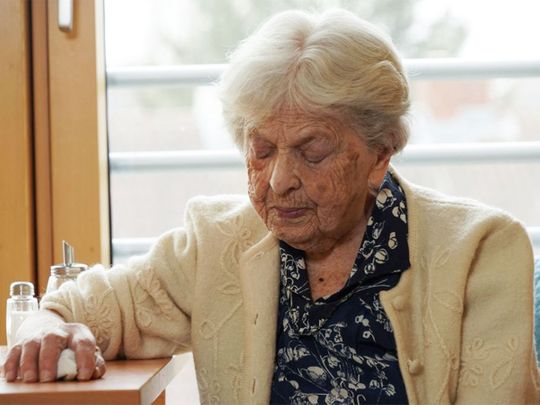
Frankfurt: Eight decades after Raisa Valiushkevych fled Ukraine to escape Nazi Germany's invasion, the 98-year-old Holocaust survivor found herself fleeing again - this time to Germany, to escape Russian shells falling around her home in Kyiv.
Speaking at a Jewish care home in Frankfurt, the retired teacher said it felt strange to have found such a refuge in the land of her former persecutors. But times had changed and she felt grateful and welcome.
Valiushkevych is one of around 50 Holocaust survivors that Jewish organisations have helped evacuate from Ukraine since Russia's attack on February 24.
Many are now in Germany, which these days has one of the largest Jewish populations in Europe and a particularly welcoming asylum policy towards Jews - part of an official policy to atone for its past.
"I have found a second homeland here, and I feel good here," Valiushkevych said in her native Russian as it snowed outside.
"I'm very grateful." Valiushkevych recalled how she, her sister and her parents first fled Ukraine in 1941 by foot and then by train to Kazahkhastan. They escaped the Nazi Holocaust which virtually wiped out Ukraine's pre-war Jewish population of about 1.5 million.
When she came back, she studied biology at university and became a teacher.
She never thought she would become a refugee again - this time at an age when her sight is failing and she is no longer well enough to leave on her own two feet.
But explosions were going off all around her apartment in Kyiv and she says she was struggling to get to the nearest bunker whenever the sirens went off.
So she accepted the offer of evacuation by the American Jewish Joint Distribution Committee, or JDC, a humanitarian group which has spent decades supporting Jews in Ukraine and had been providing her with home care.
An ambulance took her to the Polish border where she was transferred to another that took her to Frankfurt, with an overnight stay at a care home on the way for her to recover strength.
"It was difficult," said her 70-year-old son, Vadym Valiushkevych, who made the three-day journey with her. "The roads had been bombed. My mother had to get injections on the way."
Deep duty
The JDC said it had been working with the Jewish Claims Conference - a body which represents Jews in negotiations on compensation for Nazi victims and their descendants - to bring Holocaust survivors to safety.
"The Holocaust survivors are reminded of what they went through as children through today's experiences and we feel deeply the duty to not let them down this time," said Ruediger Mahlo, head of the German chapter of the Claims Conference.
Some of the elderly survivors had spent days in the freezing cold in Ukraine after their windows were shattered during recent raids, he said.
"Of course it's a huge problem to get ambulances in a war zone, a huge problem to get petrol. The ambulances are often partly falling apart and we have to keep finding solutions," he said. "The (humanitarian) corridors mostly don't work." Evacuations could involve at least 15 organisations including the foreign ministry and more than 50 officials, he said.
The huge operation came together in the days after Russia launched its attack, an action that Russian President Vladimir Putin has called a "special military operation" meant to demilitarise and "denazify" Ukraine.
Mahlo said that was an absurd turn of phrase, given the plight of Valiushkevych and other Holocaust survivors.
"In a country (Ukraine) in which there is a flourishing Jewish community built over the last decades and in which the president is Jewish, it is mockery to say that one is invading this country in order to denazify it," Mahlo said.












